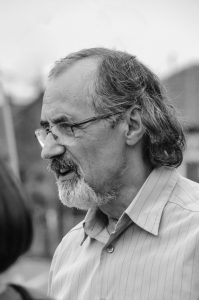Gheorghe Păun
Romanian Academy, Bucharest
Title: Numerical P Systems, After Ten Years
Slides
ABSTRACT:
Numerical P systems are a class of membrane computing models, with biological inspiration and economics motivation. They can compute both sets of numbers and languages (in both cases, computational universality results are reported). Numerical P systems were also used in
designing robot controllers. The talk briefly presents the general framework of membrane
computing, the numerical P systems, the main theoretical results, the applications, as well as open
problems and directions for further research.
designing robot controllers. The talk briefly presents the general framework of membrane
computing, the numerical P systems, the main theoretical results, the applications, as well as open
problems and directions for further research.
SHORT BIO:
Gheorghe Păun (born on December 6, 1950) graduated the Faculty of Mathematics, University of Bucharest, in 1974 and received his Ph.D. in mathematics (with specialization in computer science) from the same university in 1977. He held a research position at the University of Bucharest, and from 1990 to 2015, when he retired, he was at the Institute of Mathematics of the Romanian Academy, as a senior researcher. His main research areas are formal language theory and its applications, computational linguistics, DNA computing, and membrane computing; this last research area was initiated by him, in 1998, and the respective models are now called P systems, see http://ppage.psystems.eu). He is the honorary president of IMCS, the International Membrane Computing Society – see, e.g., http://membranecomputing.net/IMCSBulletin/index.php. He has published a large number of research papers (collaborating with many researchers worldwide), has visited and lectured at over 100 universities in Europe, Asia, and North America, and gave numerous invited talks at recognized international conferences. He has published eleven monographs in mathematics and computer science (some of them translated in Japanese, Chinese, Russian), has (co)edited over seventy collective volumes and special issues of journals, and also published many popular science books, books on recreational mathematics (games), and fiction books. He was or still is a member of the editorial board of more than two dozens international journals and was/is involved in the program/steering/organizing committees for many international conferences and workshops.
In 1997 he was elected a member of the Romanian Academy and from 2006 he is a member of Academia Europaea. He also got many other honors, in Romania or abroad (professional and literary prizes, honorary citizenship titles, six doctor honoris causa titles, etc.). In 2009 he was included in the ISI Highly Cited Scientists category, see http://isihighlycited.com.
In 1997 he was elected a member of the Romanian Academy and from 2006 he is a member of Academia Europaea. He also got many other honors, in Romania or abroad (professional and literary prizes, honorary citizenship titles, six doctor honoris causa titles, etc.). In 2009 he was included in the ISI Highly Cited Scientists category, see http://isihighlycited.com.
